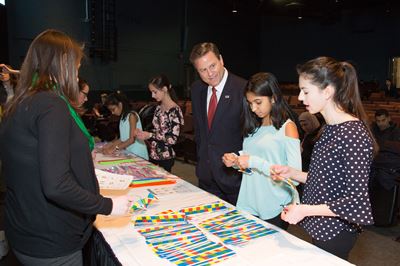 Each year on April 25, science enthusiasts around the world celebrate National DNA Day by commemorating the successful completion of the Human Genome Project in 2003 and discovery of the DNA double helix in 1953. DNA Day is an educational holiday organized by the National Human Genome Research Institute (NHGRI) to spread awareness about the latest advances in genomic research and their impact on human health.
Each year on April 25, science enthusiasts around the world celebrate National DNA Day by commemorating the successful completion of the Human Genome Project in 2003 and discovery of the DNA double helix in 1953. DNA Day is an educational holiday organized by the National Human Genome Research Institute (NHGRI) to spread awareness about the latest advances in genomic research and their impact on human health.
This year, DNA Day is celebrating the 15-year anniversary of the Human Genome Project, one of the most significant scientific endeavors of our time. The Human Genome Project was an international effort to sequence and map all of the genes in the human genome. Scientists spent over a decade developing the technology to sequence the human genome.
The field of genomics has come a long way in 15 years. The first draft sequence of the human genome took scientists over a decade to complete, but with advances in sequencing, a single genome can now be sequenced in 2 days. The cost of sequencing a human genome has decreased dramatically over the years and advancements in technology have made this possible.
Each year, we at Coriell proudly celebrate DNA Day during our annual Science Fair. In addition to presenting their research projects, students, grades 6-12, are given the opportunity to participate in DNA Day activities focused on understanding the structure and function of DNA. This year, students used DNA Origami to visualize the helical structure of DNA, and used pipe cleaners, straws and beads to build the DNA double helix.
As providers of research samples to the scientific community, DNA is at the heart of what we do. Coriell’s biobank is home to specimens collected from over 250,000 sample donors. DNA samples provided to researchers around the globe are used to study disease mechanisms, characterize genes and mutations, and develop genetic tests. The availability of high quality DNA plays a critical role in developing new drug treatments and therapies. It is now more important than ever to educate the public about the ways personalized genetic information can be used to improve health outcomes.
For information about DNA Day and happenings around the globe, you can learn more at Genome.gov.